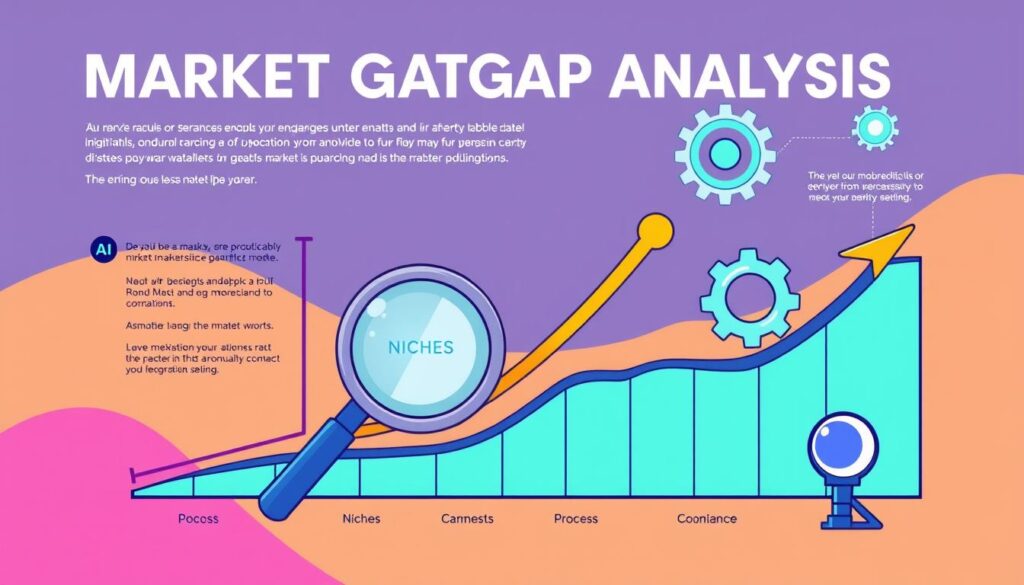Have you ever wondered how AI entrepreneurship can break through in saturated markets with laser-focused precision?
Artificial intelligence is changing the tech world fast. Tech startups are now focusing on niche apps to stand out. McKinsey says AI could add up to $13 trillion to the global economy by 2030. This shows AI’s power in meeting specific market needs.
AI isn’t just for big companies. Small to mid-sized businesses can also use AI to prevent machine failures, detect fraud, or give better financial advice. By targeting specific areas, startups can create solutions that really meet their audience’s needs.
Creating niche AI apps is more than just tech. It’s about knowing the unique challenges and opportunities in certain markets. We’ll explore how AI entrepreneurship can lead to big market wins.
The Growing Potential of Niche Markets in AI
The global AI market is booming, valued at over $196 billion and set to hit $1.81 trillion by 2030. This growth highlights the potential of niche markets in AI. These specialized areas offer chances for targeted AI solutions that can change industries and meet specific needs well.
Introduction to Niche Markets
Niche markets in AI serve unique needs in various industries. They differ from the wide AI market, focusing on specific challenges. This focus leads to innovative AI applications, improving customer satisfaction and loyalty.
For example, Netflix uses AI for personalized movie suggestions, earning $1 billion a year. By focusing on these niche areas, companies can use AI to serve specific markets better than ever.
Benefits of Focusing on Niche Markets
Targeting niche markets has many benefits for AI growth. It reduces competition, helping new tech companies become leaders in their fields. This approach also builds a loyal customer base that values customized solutions.
Moreover, niche markets push for innovation. With 83% of companies focusing on AI, there’s a drive for new technologies. This focus leads to advancements and opens up opportunities that mainstream markets might miss.
In summary, niche markets in AI are growing fast. By focusing on specific AI solutions and opportunities, companies can find new paths for growth and innovation. This will help the AI market expand in the coming years.
The Essential Role of AI in Niche Markets
Artificial Intelligence (AI) has changed how businesses work and connect with people. It helps companies use AI personalization and market analytics AI to lead the way. This part talks about how AI makes experiences better, finds new market chances, and looks at AI success stories in different fields.
AI-Powered Personalization
AI personalization lets businesses give customers unique experiences. It uses AI to understand customer data and suggest things they might like. This makes customers happier and more loyal.
AI tracks how customers interact and targets specific groups. This makes marketing better and saves time.
Identifying Untapped Market Opportunities with AI
Market analytics AI helps find new chances in the market. It uses AI to find trends and patterns that people might miss. This lets businesses find new opportunities fast.
By using these insights, companies can grow and meet customer needs better.
Case Studies of AI Success in Niche Markets
Looking at AI success stories shows its big impact. For example, Amazon uses AI for better shopping experiences. This leads to happier customers and more sales.
In eLearning, AI helps make learning personal and better. It shows how AI can change how businesses make decisions and connect with customers.

As AI gets better, its role in niche markets will grow. It offers great chances for businesses to succeed by offering unique solutions and finding new markets. Using AI like AI personalization and market analytics AI puts businesses at the top of their game.
Developing Niche AI Apps: Filling Market Gaps for Profit
In the world of AI app development, finding market gaps is key to making money. A good market gap analysis shows where needs aren’t met. This can lead to finding opportunities for niche apps.
Niche markets are great because they focus on specific needs. This focus can lead to big growth. Trends and new rules can also open up chances for your AI apps to shine. For example, looking at new SaaS trends or tech for better inventory management can show where to start.

Using tools like Google Keyword Planner can help find what people are searching for in eCommerce. This not only finds gaps but also helps you stand out. With 94% of people avoiding companies with bad reviews, solving customer problems with AI can boost your position.
Also, looking back at history, like Sir William Preece in 1876, shows the need to keep up with market changes. By watching trends, you can find where AI can make a big difference. This way, you can create profitable AI solutions that meet specific needs in the market.
Navigating Industry-Specific Challenges in AI Development
Starting on AI development in specific industries brings many challenges. These include keeping data private and overcoming technical hurdles. The journey needs a mix of knowledge and flexibility, especially in markets expected to grow to $1.85 trillion by 2030. Healthcare, finance, and entertainment offer big chances but also unique obstacles.
Ensuring high-quality training data is a big challenge. Without good data rules and tools, AI can make mistakes. It’s vital to have strict data rules and privacy standards. Following rules like GDPR helps build trust in AI.
As AI startups grow, they face the challenge of balancing costs with innovation. They often invest in training their teams and working with outside AI experts. This helps them keep up with new knowledge and improve their products.
Adding new AI to old tech is another challenge. It’s important to make sure everything works together smoothly. Startups are teaming up with others to solve these problems, making sure everything works well together.
Security and privacy are big concerns, especially in sensitive areas like healthcare and finance. Using strong encryption and privacy-first designs helps protect against threats. Finding a balance between new ideas and safety is key for success.
Understanding the market and what each industry needs helps AI startups tailor their solutions. Focusing on quick product updates can help them stand out. This way, they can grab a big share of the market while dealing with AI’s technical challenges.
Strategies for Marketing Niche AI Apps Effectively
In the fast-changing world of AI app marketing, it’s key to stand out, especially in niche markets. Knowing your audience well and using the right marketing tactics can lead to success. Here, you’ll learn about AI app marketing strategies and how to boost your brand in niche AI apps.
Targeted Marketing Techniques
Niche marketing can be very powerful if done right. Using data to guide your marketing is essential. For example, pet owners in the U.S. spent $25 billion more on pet food from 2017 to 2022. This shows a big opportunity for AI apps for pets.
Using specific keywords can help your marketing reach the right people. For example, focusing on “AI fitness app for home workouts” can attract users looking for that exact thing.
Building Brand Awareness in Niche Markets
Creating a strong brand in your niche is also crucial. Your brand should offer something unique that meets your audience’s needs. With the video game market expected to hit $97.67 billion in 2023, AI apps for gamers can really benefit by matching their brand to gamer interests.
Being consistent in your brand voice and using digital marketing tools like social media and email can help you stand out. For example, being open about your app’s benefits can win over 73% of global consumers who prefer transparent companies. Regularly engaging with your audience can build trust and loyalty.
Conclusion
AI business strategies show how crucial niche markets are for AI growth. By focusing on specific areas, you can offer solutions that meet unique needs. This approach helps your AI app stay relevant and solve real problems.
The future of niche AI apps looks bright. Using advanced tools and methods can help you improve and innovate. It’s important to keep learning and adapting to stay ahead.
By adopting these strategies, you can lead in the AI market. Building a community and reaching international markets can expand your impact. With careful planning and execution, you can unlock AI’s full potential in niche markets. This will boost both customer happiness and your business growth.
Legal Disclaimer for AIover40.com
Welcome to AIover40.com. Please note that the information provided on our blog, including comments and insights, is intended for informational and entertainment purposes only. This blog is not a source of professional advice.
No Professional Advice
The content shared on this blog is designed to provide helpful information on the topics discussed. However, this blog does not provide professional advice and should not be used as a substitute for advice from a certified professional in the fields of artificial intelligence, finance, healthcare, or any other professional domain. The use of any information provided on this blog is solely at your own risk.
Accuracy and Completeness
While we strive to keep the information up to date and correct, we make no representations or warranties of any kind, express or implied, about the completeness, accuracy, reliability, suitability, or availability of the website or the information, products, services, or related graphics found on the website for any purpose.
Limitation of Liability
In no event will AIover40.com, its affiliates or its representatives be liable for any loss or damage including without limitation, indirect or consequential loss or damage, or any loss or damage whatsoever arising from loss of data or profits arising out of, or in connection with, the use of this blog.
Consent
By using our blog, you hereby consent to our disclaimer and agree to its terms.
